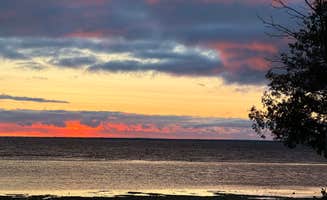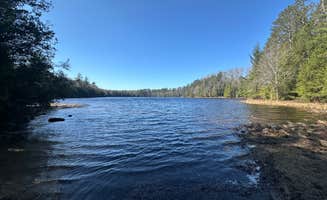Dispersed camping near Escanaba, Michigan provides access to several remote sites within Hiawatha National Forest, particularly in areas surrounding small inland lakes. Forest roads throughout the region vary seasonally, with spring thaws often creating challenging mud conditions and winter access requiring specialized equipment. Many of these backcountry camping spots serve as gateways to fishing, paddling, and wildlife observation opportunities in this section of Michigan's Upper Peninsula.
What to do
Fishing opportunities: The area between Ironjaw Lake Dispersed Campsite and neighboring waterways offers productive fishing. "Great site located between two lakes," notes camper Ben L., who appreciated the dual lake access directly from camp.
Kayaking on inland lakes: Several forest sites provide direct water access for paddlers. At Herman Lake Dispersed, one visitor reported, "We were able to kayak and it was beautiful and very private," making it worthwhile despite challenging road conditions.
Lighthouse exploration: The historic structure at Peninsula Point provides an educational side trip for campers. A visitor mentioned, "Lighthouse to explore. Would love to be there for the monarch migration," referencing the site's significance as a butterfly migration viewing area.
Night sky viewing: Clear nights offer exceptional stargazing from remote forest sites with minimal light pollution. Jacob B. from Peninsula Point mentioned, "Caught northern lights, Milky Way, and glorious sights every day," during a six-night stay.
What campers like
Lake views: Waterfront dispersed sites provide scenic vantages not available at developed campgrounds. At Peninsula Point Lighthouse Access Road - Dispersed, Neil T. described it as a "Great sunset area, pretty drive there," highlighting the aesthetic appeal.
Off-season solitude: Visiting during shoulder seasons can result in having entire lakes to yourself. One camper at Ironjaw Lake noted, "We were lucky, we went pre-season. We did have to clear a bunch of down trees to get down the road but we had the site and the lakes to ourselves."
Extended stays: Most Hiawatha National Forest dispersed sites permit camping for up to two weeks. Jacob B. reported, "Stayed for 6 nights and loved all of it," at Peninsula Point, where longer visits allow campers to fully experience the changing light and weather patterns on Lake Michigan.
Site privacy: Forest buffer between most camping spots provides natural screening. "It was gorgeous. There is a permitted site (May-Sept) at the end but multiple pull out spots for dispersed camping along the forest road," noted Willow M. about finding secluded options.
What you should know
Limited availability: Some popular areas have very few designated dispersed sites. One camper at Peninsula Point noted, "I would have rated 5 stars if there were more sites available, but if you manage to snag one of the permitted ones, lucky you!"
Road conditions: Access routes to many sites require high-clearance vehicles and sometimes tree removal. At Coalwood Trail - Dispersed Campsite, forest roads can become particularly challenging after rainfall.
Insect pressure: Mosquitoes can be intense, especially near standing water. Brad W. encountered "Tons of mosquitoes right next to a small danky pond" at Coalwood Trail, indicating the need for proper preparation.
Navigation challenges: GPS coordinates sometimes lead to incorrect locations. One Ironjaw Lake visitor warned that "The site only gives you coordinates that are actually an hour away from the site. There is no real address to get there."
Seasonal road closures: Forest service roads may become impassable during spring thaw or after heavy rainfall. A Herman Lake camper noted, "Rain was expected the following day so we only chanced it for one night afraid a tree would block the road and the mud would get worse."
Tips for camping with families
Vehicle considerations: Forest roads require appropriate vehicles for safe access. The Herman Lake visitor advised, "We went down a very deeply rutted and muddy one lane road in for about 1.5-2 miles. We have a 21 ft travel trailer. Although we stayed one night and made it to and from unscathed, we do not recommend towing down this road."
Water activities: Lakes near dispersed sites provide swimming and paddling opportunities but lack lifeguards or developed beaches. Bring personal flotation devices for all family members.
Wildlife education: Peninsula Point Lighthouse area offers opportunities to teach children about monarch butterfly migration patterns and Lake Michigan ecology during appropriate seasons.
Site selection timing: Arriving mid-week rather than weekends improves chances of securing limited dispersed sites at popular locations like Swan Lake Dispersed Campsite, which has only a few established fire rings.
Tips from RVers
Length limitations: Most forest roads leading to dispersed sites have tight turns and limited pull-through options. One visitor to Herman Lake cautioned against bringing trailers due to the "very deeply rutted and muddy one lane road."
Road verification: Check recent reviews or contact the local ranger station before attempting access with larger vehicles. Several visitors report needing to clear fallen trees from roads to reach campsites.
Passing etiquette: Peninsula Point Lighthouse road is single-lane with designated passing cutouts that require coordination with oncoming traffic. "It's a one lane road with multiple cutouts in the road for passing," confirmed one visitor.



